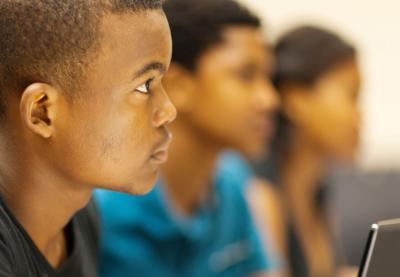Like many teachers, I returned to school on Monday, August 14, after being saturated by the events that transpired in Charlottesville, Virginia, over the weekend. As I had done post the Zimmerman trial, post Ferguson, post Charleston, post Sandra Bland, post Philando Castile and post the 2016 election, I went to work. My decision to turn off my phone, unplug from social media and avoid futile internet searches had not been enough to ease my mind on Sunday, so I pulled myself out my bed the next day and went to work.
I had nothing to say during the morning faculty meeting, though I thought about how I would engage my students in the same discourse—yet again.
However, a social media post by a teacher-friend made me rethink my plan to teach James Baldwin instead of Junot Díaz to open my senior English course this year. I realized that the students would probably be as restless and even more silent than I had been during morning staff meeting. I realized that they might not actually want to discuss the “same stuff again.”
I considered that my urban students—by which I mean the multitudes of black and brown students that live in the bowels of this country’s education system—may not necessarily benefit from another lesson on this country’s history of violence, hatred and racism. They might continue to sink into themselves or become numb at the mention of social justice and the power of voicing their concerns, of economic empowerment and protesting. Those ideas might begin to cycle in their minds as mere words, as opposed to calls to action. My students’ resolve might mirror that which they displayed after the election and after the last time white people displayed their hatred for “the Other” in a public setting. Again, they might say, “Why do we keep talking about this, Miss?” and “Nothing is going to change.”
As I myself sat with those feelings, with the profound exhaustion that has resulted from my own lived (and generational) experiences of oppression, I too questioned the importance of using the little energy I had left to continue “doing the work.”
But then I thought of Barack Obama’s use of Nelson Mandela’s words in the wake of the Charlottesville events:
No one is born hating another person because of the color of his skin, or his background, or his religion. People must learn to hate, and if they can learn to hate, they can be taught to love, for love comes more naturally to the human heart than its opposite.
While I had heard the quote many times before, I allowed it to resonate with me a bit more deeply. I sat with myself and remembered why I do this work. It is not because I love the long hours or the emotional grappling I have to do with students to get them to focus on the material when their lives are falling apart outside of my classroom. And it is not entirely the realization that the events in Charlottesville and the emotional breakdowns of my students are linked; the type of oppression on public display there is the same type of systemic pressure that causes students to enter my classroom so heavily burdened, though they may not be able to name it.
I am in this work because I am a teacher. I reminded myself that the manifestations of hate like those we saw in Charlottesville—and those we continue to see in the workplace, in the media, and in our own (increasingly gentrified) communities—are really social illnesses. So I remember that I choose to view my work as art, as a form of healing.
What enabled me to get through the first day of school was a rage so deep that it turned into an exhausted sort of numbness. But then that rage reminded me of an assignment in which I had asked students to engage in participatory action research. I drilled in their minds that knowledge is most powerful when it is acted upon.
As I geared up for what will likely be my last year of traditional teaching, I did not sift through the resources compiled by educators that give us a “quick fix” for talking about race or racism, only to return to our unit plans as scheduled. Instead, I thought about how to take the literary skills that I teach students—the ability to write, read and think—and put them into action.
I asked myself how I can teach in such a way that guides students to use literary skills to unpack dense texts, such as those that are written at levels of such low accessibility that they are meant to keep minorities from knowing, questioning or understanding their rights. I reflected on how I can get my students to organize their writing and to use words that engage politicians, demand what they need and quicken the making of policies on their behalf. I thought about how I can teach them not only to read texts by authors whose “consciousness” enrages them, but also to read so deeply and critically that they are able to develop their own meaningful readings of their worlds and communities—so that they are inclined to do something to reshape them.
So while I, too, have raced to teach Baldwin, Mandela, Frederick Douglass, Franz Fanon, Henry David Thoreau, Martin Luther King Jr. and Malcolm X in the occurrences and recurrences of the deadly hate-disease that has always plagued this great nation, I am willing to shift my practice. I am willing to consider not how to give my students something, but to lead them to do something.
Pitts teaches high school English in Harlem, New York. She is also a graduate student at Teachers College of Columbia University.


0 COMMENTS